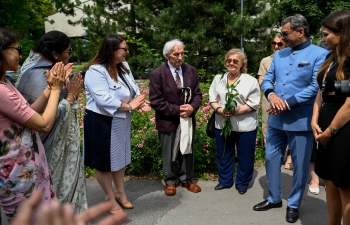

Indian Prime Minister Narendra Modi visited the Dobry Maharaja Memorial in Warsaw during his trip to Poland and paid tribute to the Jamsaheb of Nawanagar Digvijaysinhji Ranjitsinhji Jadeja. The memorial stands as a symbol of the deep gratitude and respect that the people and government of Poland have for the Jamsaheb, who sheltered over a thousand Polish children during the second World War. The historical connection between India and Poland, exemplified by the Jamsaheb's generosity, continues to be cherished by the people of both countries.
Indian Prime Minister Narendra Modi Honors Polish Children's Hero at Dobry Maharaja Memorial
During his recent visit to Poland, Indian Prime Minister Narendra Modi paid tribute to the Jamsaheb of Nawanagar, Digvijaysinhji Ranjitsinhji Jadeja, at the Dobry Maharaja Memorial in Warsaw. The memorial commemorates the Jamsaheb's heroic actions during World War II, when he sheltered over a thousand Polish children from the atrocities of the Nazi regime.
The Jamsaheb's Legacy
Digvijaysinhji Ranjitsinhji Jadeja, popularly known as "Ranji," was the ruler of the Princely State of Nawanagar in Gujarat, India. During his reign, he played a pivotal role in the Indian independence movement and promoted education and social welfare.
In 1939, with the outbreak of World War II, Ranji became a beacon of hope for Polish refugees who found themselves stranded in India. He arranged for the safe passage of over 1,000 Polish children to Nawanagar, where they were provided with food, shelter, and education.
The Jamsaheb's act of compassion earned him the eternal gratitude of the Polish people and government. In 2017, Poland honored him posthumously with the Commander's Cross of the Order of Merit of the Republic of Poland.
The Dobry Maharaja Memorial
The Dobry Maharaja Memorial, meaning "The Good Maharaja Memorial," was unveiled in 2013 in Warsaw's Praga-Południe district. The memorial features a bronze statue of Ranji and a plaque inscribed with the names of the Polish children who found refuge in Nawanagar.
The memorial serves as a poignant reminder of the historical bonds between India and Poland and the Jamsaheb's selfless act of humanitarianism. It has become a symbol of friendship, gratitude, and shared values between the two countries.
Top 5 FAQs Related to the Dobry Maharaja Memorial and India-Poland Ties
Prime Minister Modi's visit was a testament to India's gratitude for the Jamsaheb's heroic actions during World War II and to strengthen the historical ties between India and Poland.
Over 1,000 Polish children found refuge in Nawanagar during the war.
The Jamsaheb's act was a rare example of humanitarianism in the midst of war and served as a beacon of hope for the displaced Polish children.
The memorial is a physical manifestation of the deep gratitude and respect that the Polish people and government have for India and its people.
India and Poland share strong diplomatic and economic ties, with a focus on trade, investment, and cultural exchange. Both countries are also active members of international organizations such as the United Nations and the G20.

At the Asia-Pacific Economic Cooperation (APEC) Summit in South Korea, Chinese President Xi Jinping and US President Donald Trump met for their first in-person talks in several years. Despite past frictions, Xi called for closer cooperation between the two largest economies in the world, emphasizing the importance of being "partners and friends." Acknowledging Trump's peace efforts in the Middle East, Xi commended his contributions and praised him as a "tough negotiator." Trump also expressed optimism for a productive discussion on trade and global security.

In a historic event, Prime Minister Shri Narendra Modi addressed the Global Maritime Leaders Conclave and chaired the Global Maritime CEO Forum at India Maritime Week 2025 in Mumbai, welcoming participants from over 85 countries. With major shipping giants, startups, policymakers, and innovators in attendance, the summit showcased India's advancements in the maritime sector, such as the replacement of outdated colonial laws with modern ones and the recognition of large ships as infrastructure assets. Amidst global tensions, India stands as a symbol of strategic autonomy and inclusive growth, ready to take on a leading role in the world's rough seas.

Indian Prime Minister Narendra Modi has declared that the next generation of Goods and Services Tax (GST) reforms will begin on the first day of the Navratri festival. This major economic overhaul aims to streamline the current GST system and support businesses, especially small and medium enterprises. In other news, the National Human Rights Commission (NHRC) and Ministry of External Affairs (MEA) are collaborating to organize a six-day program in New Delhi to strengthen executive capacity for International Technical and Economic Cooperation (ITEC). Lastly, the upcoming BIRC 2025 conference will take place at the Bharat Mandapam in New Delhi.

Indian Prime Minister Narendra Modi is set to address the Global Maritime CEO Forum and Maritime Leaders Conclave at India Maritime Week (IMW) 2025 in Mumbai on Wednesday. The event will bring together global maritime leaders, investors, policymakers, and innovators to discuss sustainable growth and inclusive blue economy strategies, showcasing India's efforts towards becoming a leading maritime power. With the theme 'Uniting Oceans, One Maritime Vision' and participation from over 85 countries, the event will highlight India's commitment towards maritime sustainability and climate responsibility.

Cyclone Montha has intensified into a 'severe' cyclonic storm and is expected to make landfall in Andhra Pradesh this evening. The storm, which may cross the coast near the Kakinada area, is likely to bring heavy rainfall and strong winds to several districts in Andhra Pradesh. Meanwhile, the Odisha government has evacuated people from vulnerable areas and issued warnings for heavy rainfall in several districts. Commuters in the Waltair region have also been affected as train services have been cancelled, diverted, or terminated.

The India Meteorological Department has warned of an impending severe cyclonic storm, named 'Montha', that is expected to make landfall near Kakinada on the Andhra Pradesh coast. The storm has already caused heavy rain and strong winds along India's east coast and will continue to do so until Tuesday. States like Tamil Nadu, Odisha, Andhra Pradesh, and more have been placed on high alert and the government has declared holidays for schools in several districts as a precautionary measure. The Union Minister and BJP Chief has also directed party units to assist in rescue and relief operations.

While conducting routine operations on Sunday, two separate crashes involving US Navy aircraft occurred over the South China Sea, coinciding with President Trump's visit to Asia. The first involved a MH-60R Sea Hawk helicopter from the USS Nimitz, and the second involved a Boeing F/A-18F Super Hornet fighter jet. Luckily, all personnel involved were rescued without any injuries reported.

In a strong statement, President Asif Ali Zardari reiterates Pakistan's unwavering stance on the Kashmir dispute, calling India's claims on the territory illegal and in violation of international law and UN resolutions. He criticizes the recent remarks by Afghan leadership, highlighting the documented fact of terrorist attacks targeting Pakistani civilians and urging Kabul to take action against these militant elements. Zardari stresses that the fight against terrorism is a collective responsibility and Pakistan will not compromise its sovereignty or national security.

A tragic bus accident in Andhra Pradesh, India, which claimed the lives of 19 passengers, has been linked to a drunken biker, B Shiva Shankar. According to forensic reports and police investigations, the biker's reckless and intoxicated driving caused the initial crash that led to the bus fire. The bus was also carrying a consignment of smartphones and electric batteries, intensifying the fire and explosion. The second bus driver, who was reportedly sober, is cooperating with the investigation as police continue to file cases based on evidence and eyewitness accounts.

Indian Prime Minister Narendra Modi declared that the year 2026 will be marked as the "ASEAN-India Year of Maritime Cooperation" during the 22nd ASEAN-India Summit. This announcement highlights India's growing alignment with the ASEAN bloc, with Modi emphasizing the importance of the partnership in terms of strategic and economic cooperation. The Summit's theme of "Inclusivity and Sustainability" also reflects the shared priorities of both India and ASEAN, with joint efforts in areas such as digital inclusion, food security, and resilient supply chains. In addition to strategic cooperation, Modi also highlighted the expansion of collaboration in other areas such as education, tourism, and cybersecurity, while acknowledging the new member Timor-Leste and extending condolences to Thailand. Looking ahead, Modi expressed confidence in the long-term vision of ASEAN and India's development goals, stating that the 21st century belongs to both India and ASEAN.